Scanning depth and accuracy
The best DAST tools offer a deep and critical scan of all layers and components, accurately identifying complex and hidden vulnerabilities.
Pro tip: A DAST tool for mobile apps identifies mobile-specific issues, such as insecure data storage, improper session handling, and insecure communication.
Severity assessment and reporting
Once the vulnerabilities are identified, dynamic application security testing tools categorize them based on their impact. This helps developers prioritize remediation efforts and focus on the most critical weaknesses first.
Pro tip: The best DAST tools provide detailed reports with suggested remediation steps and a severity score that follows the CVSS standard.
Customizable reports
They should provide comprehensive reporting, dashboards, and visualizations and display risk trends and levels, compliance status, and remediation progress.
DAST tools present custom reports extrapolating all implications of compliance, risk classification, and detected exposures for stakeholders to gain visibility into the organization’s security posture.
Pro tip: Choose a DAST tool for mobile applications that provides remediation guidance to address highlighted issues.
CI/CD pipeline integration
Integration with the CI/CD pipeline enables continuous testing throughout the development lifecycle, allowing the DAST tools to run tests automatically.
Automation (including emulators v/s real devices)
Automation allows you to catch vulnerabilities early, reducing the risk of introducing new security issues and accelerating the time to market.
Choose a DAST tool that allows real-time device testing rather than emulators/simulators, just like Appknox.
Testing on real devices provides a more accurate simulation of actual user environments, making it easier to catch issues like device-specific crashes, real-time network behavior, and hardware-specific vulnerabilities.
7 Best DAST tools for mobile application security
1. Appknox
With a mobile-first approach, Appknox is one of the best DAST scanning tools for performing dynamic analysis in real operational environments. The automated DAST platform outperforms the competition by boosting the average release time in security testing by 75%.
Key gestures of Appknox’s automated DAST
By integrating your existing developer’s tools set with Appknox, you can enable the security team to work in parallel with development teams.
Here’s how Appknox’s automated dynamic analysis solutions can make your app more secure:
Real-device testing
Real mobile devices help replicate the real world more accurately, enabling you to test with different network conditions and device configurations and providing more accurate results.
DAST scan automation
Appknox helps with consistent and repeatable scans with minimal intervention.
High test accuracy
Rest easy with Appknox’s automated VA and manual PT, which accurately identify security issues and significantly reduce false positives and negatives to less than 1%, above the industry standard.
Extensive coverage of test cases
Appknox covers more than 160 automated test cases for mobile apps.
Integration with CI/CD pipelines
Tests can be executed with code push or app update, making it a part of the development process and addressing issues sooner.
CVSS reporting
You can get detailed reports with CVSS scores with just a single click, helping your security team prioritize the most critical issues.
Comprehensive vulnerability scanning
In-depth scans of mobile apps identify a wide array of vulnerabilities, including OWASP mobile top 10 risks, security malfunctions, and API vulnerabilities.
Remediation call
Get personalized guidance to help discover their vulnerabilities and explore mitigation methods faster.
Pros
- The mobile-first approach has a strong focus on mobile apps
- Continuous monitoring and support
- 80+ Devsec integrations
Cons
- Mobile-first dynamic analysis testing
Pricing
- Starter
- Professional
- Advanced
Appknox offers flexible, usage-based pricing based on the customer requirements with add-ons for manual testing.
2. MobSF
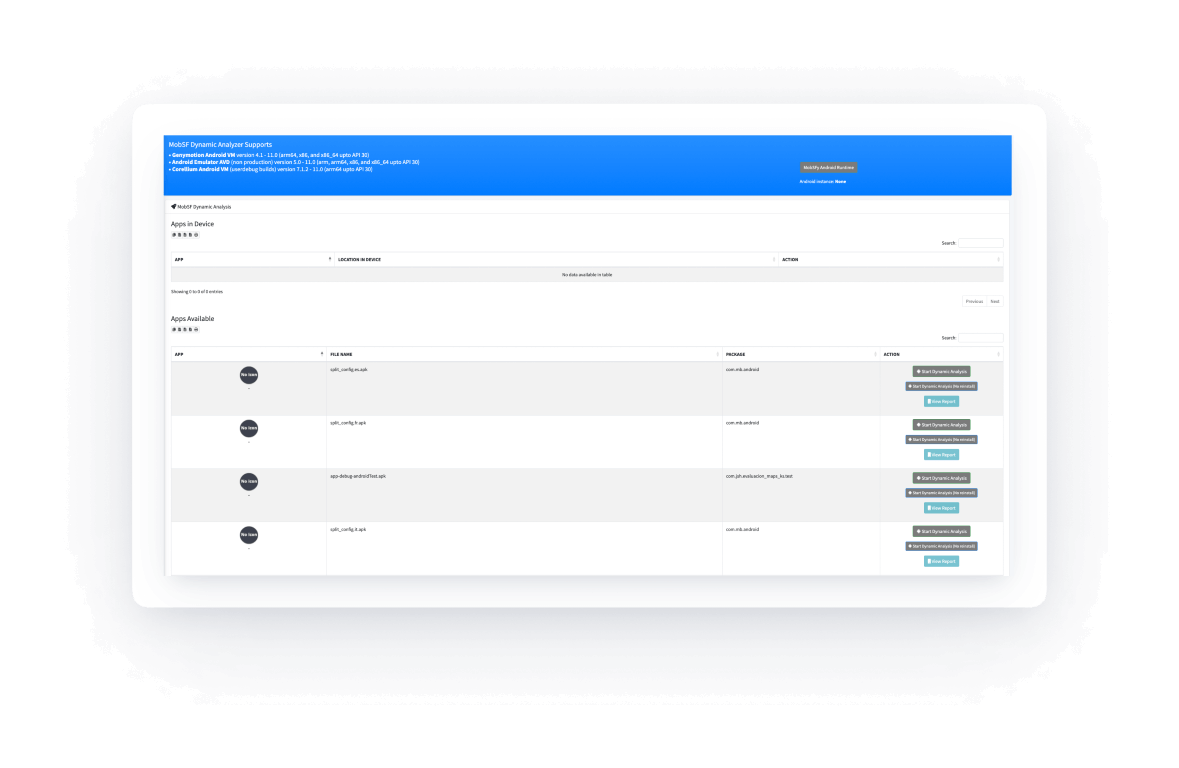
Mobile Security Framework (MobSF) is a free open-source SAST and DAST tool. MobSF relies on emulator-based testing, which can lead to high flakiness rates.
The open-source tool is suitable for static testing but falls short for enterprises requiring more rigorous testing.
Pros
- Performs static testing and malware checks
- Open-source
Cons
- Limited support for iOS DAST
- High false positives and negatives
- No regular updates as it is open-source and free
Pricing
3. eShard (esReverse)
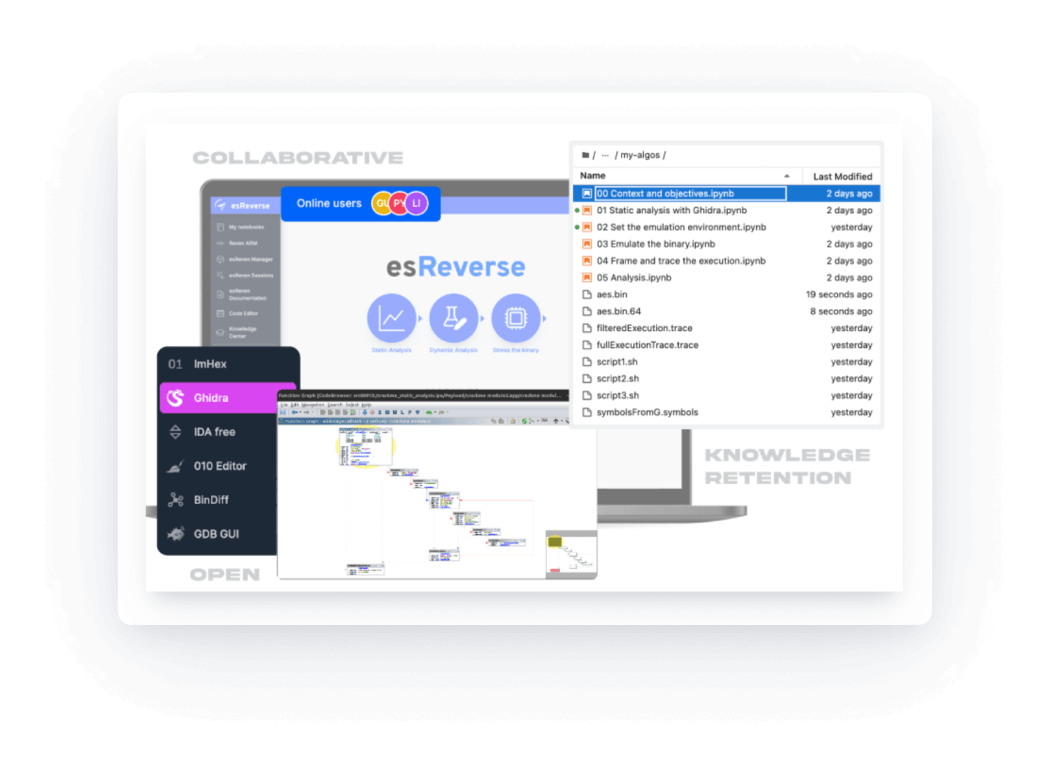
esReverse, a product of eShard, is an all-in-one platform for software binary analysis. This collaborative platform helps cybersecurity teams validate protections at the binary level by targeting software defenses embedded in the chip.
esReverse offers binary, static, and dynamic testing, penetration testing, vulnerability research, code validation, and binary debugging for websites and web applications.
Pros
- In-depth binary analysis for mobile applications
- Advanced emulation capabilities provide control over the runtime environment
Cons
- esReverse primarily focuses on binary analysis, which may not cover all application security needs
Pricing
4. Checkmarx DAST
.png?width=1027&height=768&name=Checkmarx%20(1).png)
The cloud-native Checkmarx DAST helps enterprise organizations consolidate their AppSec and unify scan tools. As one of the automated DAST scanning tools, Checkmarx offers comprehensive security and lowers the total cost of ownership for web applications.
The standout features include unified reporting to correlate DAST and SAST vulnerabilities, integration with the CI/CD pipeline, automated testing during development and pre-production, testing endpoints, and scanning live APIs.
Pros
- API global inventory allows you to see API vulnerabilities discovered by DAST and SAST in a centralized location.
- Broad technology support makes it compatible with various web technologies and frameworks.
Cons
- Primary focus on web applications rather than mobile
- Analytics reports lack risk prioritization
Pricing
5. Rapid7
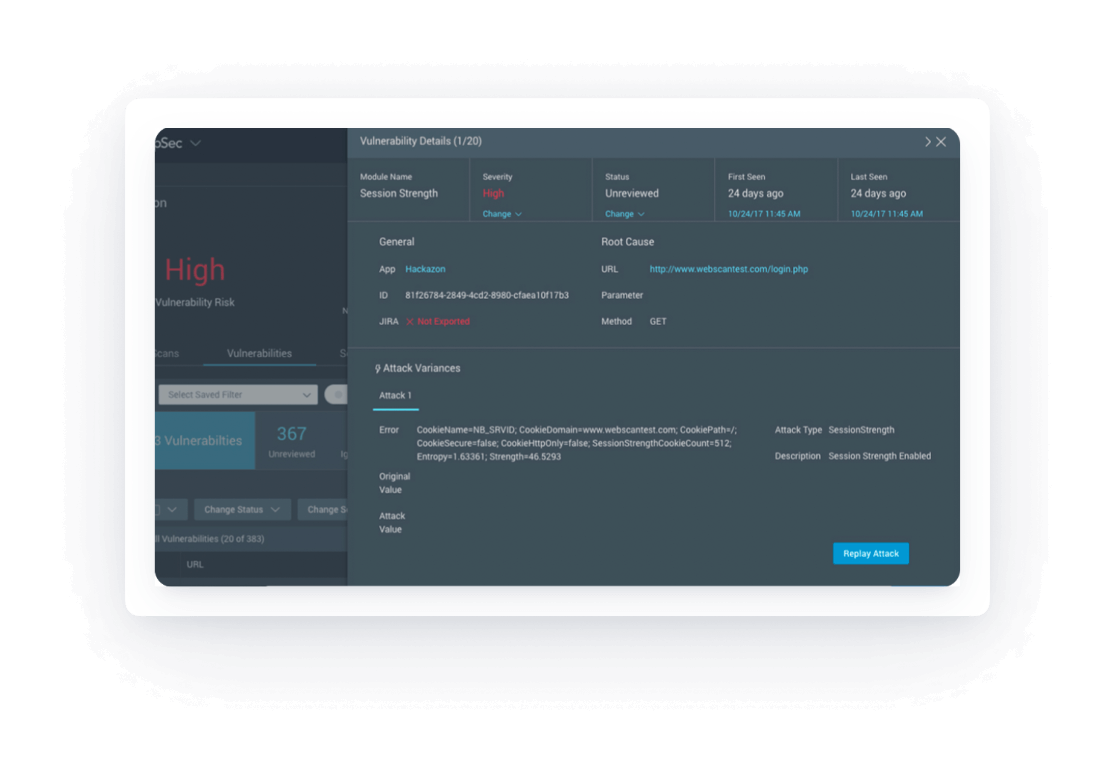
InsightAppSec by Rapid7 performs black box security testing to automate identification, triage vulnerabilities, prioritize actions, and remediate application risks in modern web applications.
This DAST scanning tool gives actionable and accurate insights with an attack framework and library. Developers can run additional scans to test a new security bug patch directly from the vulnerability report.
The optional on-premise engine allows scanning web applications hosted on closed networks. Attack Replay, a standout feature that separates InsightAppSec from this list of DAST tools, lets developers validate vulnerabilities and test source code patches independently.
Pros
- The tool covers over 95 attack types, including OWASP Top Ten and even misconfigurations in running web applications.
- Attack Replay allows developers to confirm a vulnerability on their own without having to wait for the security team to run another validation scan.
Cons
- Focus on web applications might leave gaps for organizations that require mobile application testing.
- The reporting features are subpar and complex.
- False positives are reported as patches missing.
Pricing
- Subscription starts at 175$ per month for a single app
6. Black Duck DAST (Previously Synopsys WhiteHat Dynamic)
.png?width=900&height=768&name=Black%20Duck%20(1).png)
Blackduck’s cloud-based continuous dynamic application security testing (DAST) solution allows enterprise organizations to scan and test websites and applications at scale and identify security risks.
Continuous scanning detects and adapts to code changes and ensures new functionality is automatically tested. With the tool, DevSec teams can securely perform the DAST testing on production applications without requiring a separate test environment.
Pros
- AI-powered verification reduces false positives and minimizes vulnerability triage time.
- Real-time data tracking into the security of all your websites.
Cons
- The tool throws out false positives that can become a problem, especially when the scan is done on a large codebase.
- The web-based DAST falls short for organizations that require robust testing for mobile applications.
Pricing
7. Nuclei
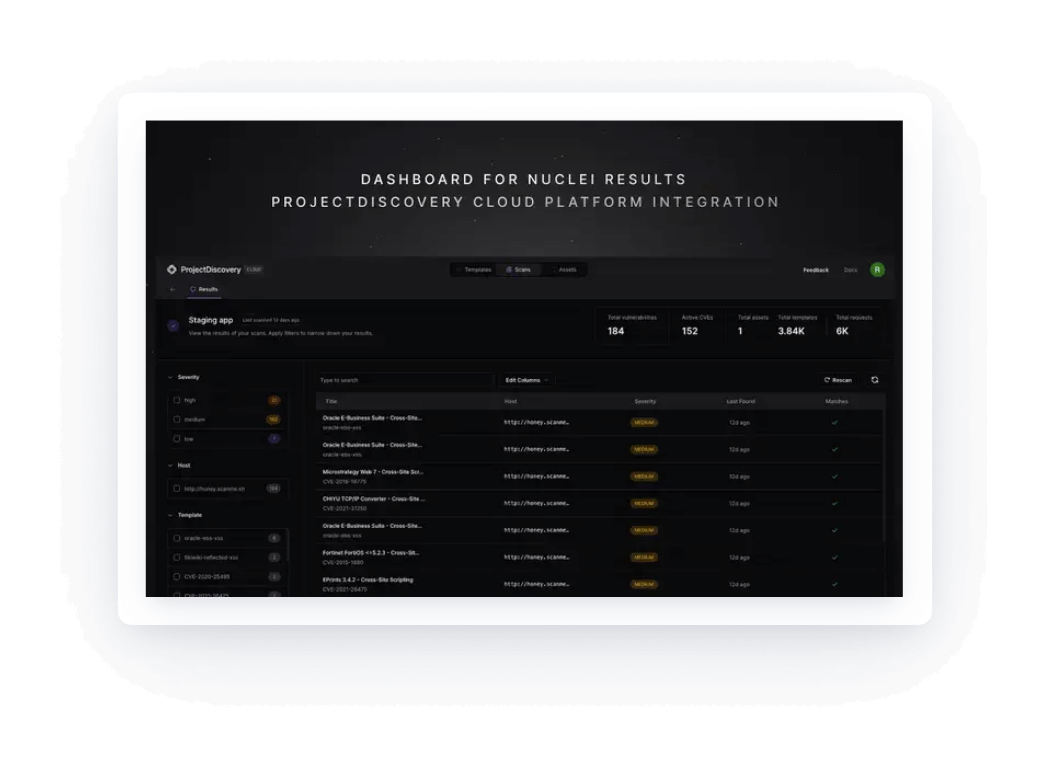
Nuclei is a customizable vulnerability scanner built on YAML-based templates for automated security testing. The open-source vulnerability scanner allows users to design custom vulnerability detection scenarios that mimic real-world conditions for zero false positives.
It is not specifically a DAST (Dynamic Application Security Testing) or SAST (Static Application Security Testing) tool but a flexible, template-based vulnerability scanner that can perform various security checks.
Pros
- AI-powered Nuclei templates identify and communicate vulnerabilities, combining essential details like severity ratings and detection methods.
- Open source, contributed by thousands of security professionals to tackle trending vulnerabilities.
- Integrates into the CI/CD pipeline for vulnerability checks, surveillance, regression, and penetration testing.
Cons
- It lacks the full interactivity of traditional DAST tools, so it might miss complex vulnerabilities requiring deeper testing within the application’s runtime.
- Limited reporting capabilities compared to other vulnerability scanners.
Pricing
At a glance: Best DAST tools for mobile applications
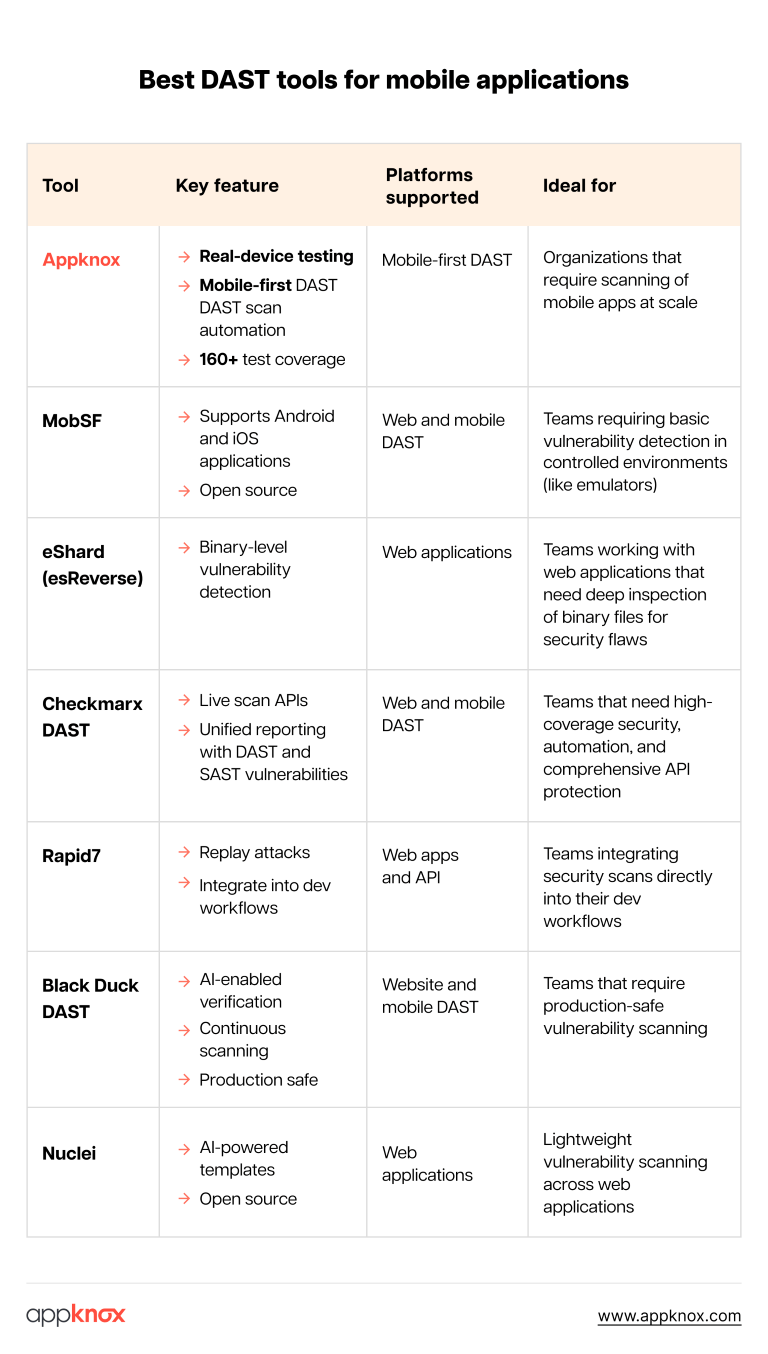
Expert’s corner
 |
Harshit Agarwal Harshit Agarwal is the co-founder and CEO of Appknox, a mobile security suite that helps enterprises automate mobile security. Over the last decade, Harshit has worked with 500+ businesses ranging from top financial institutions to Fortune 100 companies, helping them enhance their security measures. |
|
|
TL;DR
Proactive mobile app security starts with the right DAST tool, which ensures security and agility in the development lifecycle.
A mobile-first dynamic application security testing tool such as Appknox tests on real devices instead of emulators and against mobile-specific vulnerabilities that traditional DAST tools miss out on. Appknox’s automated DAST tool significantly reduces the time and cost of fixing vulnerabilities.
With <1% false positives, 160+ test case coverage, seamless CI/CD integration into the developer workflows, on-call support for mitigating vulnerabilities, intuitive dashboards to run scans and generate reports, and manual and automated penetration testing, Appknox helps you proactively security your mobile applications at scale.












.png)

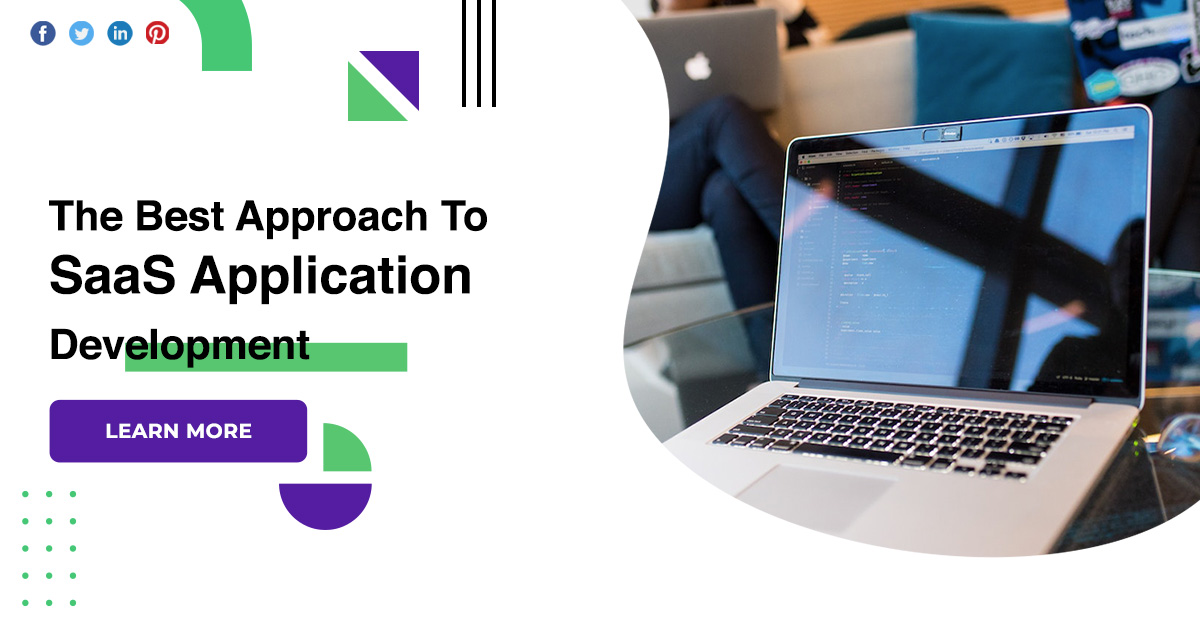






Discussion about this post